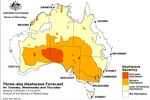Massive Forest Fires and Mitigating Stratigies in New Arena: A Case Study - IJERT
←
→
Page content transcription
If your browser does not render page correctly, please read the page content below
Published by : International Journal of Engineering Research & Technology (IJERT)
http://www.ijert.org ISSN: 2278-0181
Vol. 9 Issue 08, August-2020
Massive Forest Fires and Mitigating Stratigies in New
Arena: A Case Study
Sonakshi Saxena*
Department Of Economic
Chaudhary Charan Singh (CCS)
University, Meerut (UP)
Abstract:- This research paper is a case study of Massive forest fires and Mitigating Strategies in New Arena. This paper helps to
identifies the resources that need to be redirected to prevent forest fires and also to identifies existing management practises that
encourage harmful fires and promote management systems that mimic natural fires regime. This paper was reviewed and explained
with the help of secondary data available through various journals , magazines, government publications, previous research papers
and other useful internet materials. Paper presents and attempts to study, the resources that need to be redirected to prevent forest
fires and also to identifies existing management practises in India, Australia, and Russia.
Keywords- Massive Forest Fires,Uttarakhand, globally, Temperature, siberia.
INTRODUCTION
Food And Agriculture organisation (FAO), 'land with a tree canopy cover of more than 10 percent and area of more than 0.5
hectares.' Forest fires are the growing issue in new arena. Throughout the world, forest fires are out of control. Many millions
of hectares are burnt in the last three decades, affecting health and livlihoods. Globally, most forest fires are probably now
directly or indirectly influenced by humans and climate change. The world has two problems with fires : an increase in
unwanted fires and a parallel reduction in necessary fires. Conversely, each year many natural or beneficial fires are suppressed,
which with have negative impact over the long term.
Now let's consider massive forest fires in different countries.
IJERTV9IS080041 www.ijert.org 114
(This work is licensed under a Creative Commons Attribution 4.0 International License.)Published by : International Journal of Engineering Research & Technology (IJERT)
http://www.ijert.org ISSN: 2278-0181
Vol. 9 Issue 08, August-2020
REVIEW OF LITERATURE
1. Peter Moore, Jeff Hardesty, Stephen Kelleher, Stuart Maggins on their paper ' Forest and wildfires : fixing the future by
avoiding the past' stated, each year wildfires destroy 6 to 14 millions hectares Of fire sensitive forests worldwide, a rate of loss
and degradation comparable to that of destructive logging agricultural conversion. Those areas that are hot and dry for part of
each year, where frequent fires would be expected, human influence has now become so pervasive.
2. Muchkund pant, Vinay purohit on their paper ' Forest fire - A case study on four national parks of Uttarakhand'. Uttarakhand
is an Himalayan state which holds a large number of species of wild flora and fauna. Uttarakhand has 45.32% of its
geographical area under the forest cover. Each year witnesses a large number of forest fires.
OBJECTIVES
1. TO identifies the resources in different countries that need to be redirected to prevent forest fires.
2.To identifies existing management practises in India, Australia, and Russia that encourage harmful fires.
3. To evaluate the management systems that prevent natural fire regime.
RESEARCH METHODOLOGY
The current study attempts to explain the Massive Forest fires in different countries in new arena and also examine the
management practises that encourage harmful fires, identifies the resources that need to be redirected, and evaluate the
management systems that mimic natural fires.
The nature of research is completely descriptive. It is conceptual research which is based on review of previously researches in
this area. All the relevant data used in research paper has been collected from secondary sources e.g. e-journals, newspapers,
and various other internet resources.
1. Forest fires in India
Source :Forest Survey Of India
Graphical representation showing the total forest fires in 13 years
According to India State of forest report 2019, over 30,000 incidents of forest fires were reported in india in 2019. Additionally,
more than 36% of indian forest cover (657, 000 square kilometers) area is prone to frequent forest fires and of this, 10% are
highly prone according to Forest Survey Of India (FSI) report on forest fire prone forest areas.
IJERTV9IS080041 www.ijert.org 115
(This work is licensed under a Creative Commons Attribution 4.0 International License.)Published by : International Journal of Engineering Research & Technology (IJERT)
http://www.ijert.org ISSN: 2278-0181
Vol. 9 Issue 08, August-2020
UTTARAKHAND FOREST FIRES (2020)
Source: Internet
Uttarakhand is an Himalayan state which holds a large number of species Of wild flora and fauna. Every year Uttarakhand
witnesses a large number of wild fires i.e. 20 fires in four days, recently. Kumaon Division is the most common zone of forest
fires. The most common reason of forest fires, as the temperature in Uttarakhand continue to rise and reduced percipitation due
to climate change in large parts of the hills state are under raging fire. According to a report, In 2020 the area under forest fires
reached 20,377.77 hectares, which is 793 hectares more than the land impacted by forest fires last years.
Sap from pine trees
Presence of pine trees in most of the areas is also one of the main reason for forest fires. Pine trees produced a lot of sap, also
known as rosin, which is highly flammable and burns very hot.
IJERTV9IS080041 www.ijert.org 116
(This work is licensed under a Creative Commons Attribution 4.0 International License.)Published by : International Journal of Engineering Research & Technology (IJERT)
http://www.ijert.org ISSN: 2278-0181
Vol. 9 Issue 08, August-2020
The Chief conservator of forest has been set up but it has remained as thoothless tiger. It was created to fight forest fires after
devastating blaze in the year 2016.
A former official who held the position told that, " I had no power to make budgetry allocations, intimate surveys or research.
Forest fires management needs statewide long-term policies, but there was noprovision for that ". The Forest Drone Force is
also stretchef thin.
IJERTV9IS080041 www.ijert.org 117
(This work is licensed under a Creative Commons Attribution 4.0 International License.)Published by : International Journal of Engineering Research & Technology (IJERT)
http://www.ijert.org ISSN: 2278-0181
Vol. 9 Issue 08, August-2020
2. Forest fires in Australia
A bushfire burns out of control in Namadgi National Park.
Source :internet
CANBERRA FOREST FIRES (2020)
A bushfire burns out of control in Namadgi National park. The fire strated from remote bushland in rugged terrain that is
inaccessible to ground crews. The fire is threatening the town of Tharwa, South of Canberra.
Bushfire are expected to creep dangerous close to canberra. Source: internet
Australia's deadly fires have been fuelled by a combination of extreme heat, prologed drought and strong winds. The country is
in the grip of heat wave, with record-breaking temperature over the last years. The Bureau of Meterology data shows average
temperature record across the country beat previous high of 2013. The year 2019 was the hottest on record for Australia with the
temperature reading 1.52 degree Celsius above the long term average.
Canberra massive bushfire (2020) source:internet
The main reason of such massive fires can be, all the follows the country's driest spring since record began 120 years ago, with
much of New South Wales and Queensland experiencing rainfalls short since early 2017. Trees, shrubs and grasslands have
turned into the perfect tinder for flame.
3.Forest fires in Russia
SIBERIA FOREST FIRES (2020)
Wildfires in siberia have burned down an area larger than Greece- CBS News
With the area of 13.1milion square kilometers. Siberia makes up roughly 77% of Russia's total territory and almost 9% of earth's
surface.
The climate of siberia varies drastically, but it typically has short summers and long, brutally cold winters.
Vegetation in Siberia is mostly taiga, with a tundra belt on the Northern fringe, and a temperate forest zone in the South heat
wave is blowing. Siberia has been experiencing extreme heat due to a combination of persistent sunny weather and human
caused climate change.
IJERTV9IS080041 www.ijert.org 118
(This work is licensed under a Creative Commons Attribution 4.0 International License.)Published by : International Journal of Engineering Research & Technology (IJERT)
http://www.ijert.org ISSN: 2278-0181
Vol. 9 Issue 08, August-2020
The has has broken many temperature records. In the 1st six months of 2020, Siberia experienced a period of unusually high
temperatures, including a record-breaking 38 degree Celsius in the town of Verkhoyansk.
The total area burnt by wildland fires in Russia sincethe beginning of 2020has reached 19 million hectares. (Greece). The fire
started to spread across Siberian forests around the midfle of june. The following factors have caused the fires to spread
aggressively -extreme dry ground, hotter than average temperature, heat lightning, strong winds.
Massive forest fire in Siberia(2020)
CONCLUSION OF THE STUDY
Forest fires are caused by extreme weather not necessarily true. Globally, most forest fires are probably now directly or
indirectly influenced by humans. Human set fires, not least because it is cheap and simple land management tool, and for
poorer people or smallholders the only option. Those areas that are hot and dry for part of each year, where frequent fires can
be expected, human influence has now become so pervasive the most fires are -unnatural. Mitigation techniques seemed to
have had little or no effect at all. Unplanned development has also affected the forest fires.
SUGGESTIONS
1. Identification and Mapping of all fire prone areas.
2. Compilation and analysis of data base on the damage due to forest areas .
3. Installation of Forest Danger Rating systems anf Fire forcasting systems.
REFERENCE
[1] The Times Of India, reported on May 24, 2020.
[2] State forest department of Uttarakhand
[3] 9NEWS reported on january 2, 2020
[4] Bureau of Meterology
[5] CBS NEWS
[6] World weather Attribution
[7] International NGO Green peace
[8] Peter Moore, Jeff Hardesty, Stephen Kelleher, Stuart Maggins on their paper ' Forest and wildfires : fixing the future by avoiding the past'.
[9] Muchkund pant, Vinay purohit, (2019) on their paper ' Forest fire - A case study on four national parks of Uttarakhand'.
IJERTV9IS080041 www.ijert.org 119
(This work is licensed under a Creative Commons Attribution 4.0 International License.)You can also read

























































